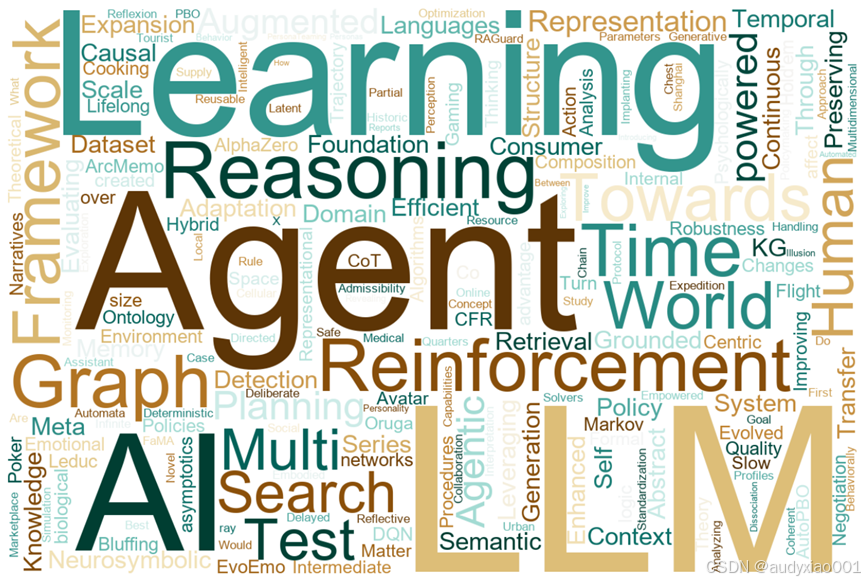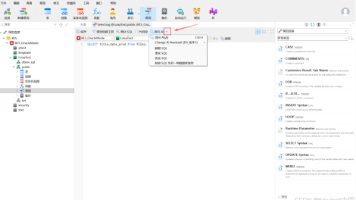arXiv 2025年8月Artificial Intelligence领域研究热点探秘
本文详细解读了arXiv上2025年8月Artificial Intelligence的研究热点,可以为读者跟踪AI领域的研究热点提供一些有价值的参考。
本推文聚焦Artificial Intelligence领域,以图文结合的形式梳理2025年8月的最新研究趋势。内容涵盖多模态大模型、知识图谱推理、模型可解释性以及安全对齐等前沿方向,旨在帮助读者快速掌握人工智能领域的最新动态。
推文作者为邱雪,审核为黄星宇和许东舟。
一、简要介绍
在arXiv网站中,Artificial Intelligence分区的论文集中展示了人工智能领域从基础理论到实际应用的前沿成果。内容涵盖多模态大模型、知识表示与推理、规划与决策、可解释性、安全对齐等多个方向。研究者能够在论文正式发表前将相关工作上传至该分区,与全球学界和产业界共享进展,推动人工智能技术的持续创新与跨领域应用。
arXiv官网:https://arxiv.org/
AI分区网站:https://arxiv.org/list/cs.AI/recent
二、论文内容
本文分析了2025年8月发表在arXiv上Artificial Intelligence领域的论文,表1列出了50篇最新的相关研究。表2对论文标题中出现频率最高的10个主题词进行了整理和统计。
表1 论文内容
|
编号 |
文章名称 |
|
1 |
ArcMemo: Abstract Reasoning Composition with Lifelong LLM Memory |
|
2 |
Psychologically Enhanced AI Agents |
|
3 |
Improving Robustness of AlphaZero Algorithms to Test-Time Environment Changes |
|
4 |
EvoEmo: Towards Evolved Emotional Policies for LLM Agents in Multi-Turn Negotiation |
|
5 |
Evaluating Quality of Gaming Narratives Co-created with AI |
|
6 |
Domain size asymptotics for Markov logic networks |
|
7 |
Towards an Action-Centric Ontology for Cooking Procedures Using Temporal Graphs |
|
8 |
The human biological advantage over AI |
|
9 |
Analysis of Bluffing by DQN and CFR in Leduc Hold'em Poker |
|
10 |
Hybrid Reinforcement Learning and Search for Flight Trajectory Planning |
|
11 |
Intermediate Languages Matter: Formal Languages and LLMs affect Neurosymbolic Reasoning |
|
12 |
Oruga: An Avatar of Representational Systems Theory |
|
13 |
CoT-Space: A Theoretical Framework for Internal Slow-Thinking via Reinforcement Learning |
|
14 |
AutoPBO: LLM-powered Optimization for Local Search PBO Solvers |
|
15 |
Meta-Policy Reflexion: Reusable Reflective Memory and Rule Admissibility for Resource-Efficient LLM Agent |
|
16 |
World Model Implanting for Test-time Adaptation of Embodied Agents |
|
17 |
Handling Infinite Domain Parameters in Planning Through Best-First Search with Delayed Partial Expansions |
|
18 |
A Foundation Model for Chest X-ray Interpretation with Grounded Reasoning via Online Reinforcement Learning |
|
19 |
FaMA: LLM-Empowered Agentic Assistant for Consumer-to-Consumer Marketplace |
|
20 |
Expedition & Expansion: Leveraging Semantic Representations for Goal-Directed Exploration in Continuous Cellular Automata |
|
21 |
Continuous Monitoring of Large-Scale Generative AI via Deterministic Knowledge Graph Structures |
|
22 |
A Multidimensional AI-powered Framework for Analyzing Tourist Perception in Historic Urban Quarters: A Case Study in Shanghai |
|
23 |
An Agentic Model Context Protocol Framework for Medical Concept Standardization |
|
24 |
What Would an LLM Do? Evaluating Policymaking Capabilities of Large Language Models |
|
25 |
Learning to Deliberate: Meta-policy Collaboration for Agentic LLMs with Multi-agent Reinforcement Learning |
|
26 |
Leveraging LLM-Based Agents for Intelligent Supply Chain Planning |
|
27 |
RAGuard: A Novel Approach for in-context Safe Retrieval Augmented Generation for LLMs |
|
28 |
Are LLM Agents Behaviorally Coherent? Latent Profiles for Social Simulation |
|
29 |
The Personality Illusion: Revealing Dissociation Between Self-Reports & Behavior in LLMs |
|
30 |
PersonaTeaming: Exploring How Introducing Personas Can Improve Automated AI Red-Teaming |
|
31 |
An Empirical Evaluation of Factors Affecting SHAP Explanation of Time Series Classification |
|
32 |
Emergent Hierarchical Reasoning in LLMs through Reinforcement Learning |
|
33 |
Towards a Neurosymbolic Reasoning System Grounded in Schematic Representations |
|
34 |
CausalARC: Abstract Reasoning with Causal World Models |
|
35 |
Explainable Knowledge Graph Retrieval-Augmented Generation (KG-RAG) with KG-SMILE |
|
36 |
Learning When to Plan: Efficiently Allocating Test-Time Compute for LLM Agents |
|
37 |
Diffusion-RL Based Air Traffic Conflict Detection and Resolution Method |
|
38 |
Multilinear and Linear Programs for Partially Identifiable Queries in Quasi-Markovian Structural Causal Models |
|
39 |
PG-Agent: An Agent Powered by Page Graph |
|
40 |
ChronoGraph: A Real-World Graph-Based Multivariate Time Series Dataset |
|
41 |
Delta Activations: A Representation for Finetuned Large Language Models |
|
42 |
DEXOP: A Device for Robotic Transfer of Dexterous Human Manipulation |
|
43 |
Towards a Unified View of Large Language Model Post-Training |
|
44 |
No Thoughts Just AI: Biased LLM Recommendations Limit Human Agency in Resume Screening |
|
45 |
IPA: An Information-Preserving Input Projection Framework for Efficient Foundation Model Adaptation |
|
46 |
SSGaussian: Semantic-Aware and Structure-Preserving 3D Style Transfer |
|
47 |
Parking Availability Prediction via Fusing Multi-Source Data with A Self-Supervised Learning Enhanced Spatio-Temporal Inverted Transformer |
|
48 |
PARCO: Phoneme-Augmented Robust Contextual ASR via Contrastive Entity Disambiguation |
|
49 |
AUDETER: A Large-scale Dataset for Deepfake Audio Detection in Open Worlds |
|
50 |
From Editor to Dense Geometry Estimator |
表2 高频关键词TOP10
|
高频词 |
词频 |
|
Learning |
8 |
|
LLM |
7 |
|
Reasoning |
6 |
|
AI |
6 |
|
Agents |
6 |
|
Reinforcement |
5 |
|
Graph |
5 |
|
Model |
5 |
|
Generation |
3 |
|
System |
3 |
三、热点分析
图1展示了Artificial Intelligence领域所有论文标题中研究热点生成的词云图,更加直观地为相关领域的研究人员提供研究方向上的参考。

图1 由2025年8月标题高频词生成的词云
在本月论文中,Learning与LLM相关研究高频出现,稳居核心位置,凸显了大模型与强化学习在人工智能研究中的基础性与统领地位。从整体趋势看,“Reasoning”、“Agent”、“Model”、“Reinforcement”、“AI”等主题贯穿多个研究方向,展现出AI领域的多元探索与新兴焦点。以下将从主要研究方向出发,分析其价值与发展动向。
1. 推理与抽象能力的持续深化
高频主题:Reasoning(6)、Abstract(3)、Causal(2)
本期论文强调模型在复杂推理与抽象能力上的突破。包括利用Causal World Models的因果推理、Matrix-of-Thought递归思维框架,以及神经符号混合的推理系统。趋势表明,研究正在从“答案生成”转向“过程可解释与可验证”的深层推理。
2. 智能体与交互式应用的快速扩张
高频主题:Agent(6)、Dialogue/Interaction(3)、Human-Agent(2)
智能体研究从博弈(扑克Bluffing、谈判策略)到实际应用(供应链、医疗标准化、市场平台助理)均有覆盖。论文关注智能体的长期记忆、个性化角色设定与社会模拟一致性,标志着研究正在朝着“具备人格与行为模式”的新阶段演进。
3. 强化学习与规划优化的多领域拓展
高频主题:Reinforcement(5)、Planning(3)、Optimization(2)
强化学习不仅应用于传统博弈,还扩展到飞行轨迹规划、空中交通冲突检测和多智能体协作。研究探索RL与搜索、RL与扩散模型的结合,为复杂环境下的鲁棒决策提供新思路。
4. 模型结构与后训练方法的演进
高频主题:Model(5)、Post-Training(2)、Adaptation(2)
论文探讨了模型微调与后训练(post-training)的统一视角,以及Delta Activations表征、信息保持型输入投影(IPA)等技术。相关成果凸显“如何在保证效率的前提下实现高质量模型迁移与适配”。
5. 多模态与生成式任务的丰富探索
高频主题:Multimodal(3)、Speech(2)、3D(2)
研究涵盖视觉-语言的共同语境建模、语音驱动的人机交互、手语与3D风格迁移等方向。部分论文聚焦深伪检测与音视频对齐问题,反映出多模态安全与真实性检测的重要性。
6. 医疗与社会应用的跨学科融合
高频主题:Medical(2)、Health(2)、Social Simulation(1)
医疗影像解读、心理健康分析、社会认知建模成为亮点。例如胸片解读的基础模型、语音驱动的认知筛查、智能体在社会学模拟中的一致性研究,展现了AI在公共健康与社会科学中的广泛潜力。
四、总结
本文的分析表明人工智能研究正在沿着“推理深化—智能体化—跨学科应用”的路径发展。以推理为核心、强化学习为驱动,多模态与社会应用为扩展,研究者们正不断推动大模型及智能体走向更鲁棒、更可信、更具应用价值的未来。
更多推荐
 已为社区贡献53条内容
已为社区贡献53条内容









所有评论(0)